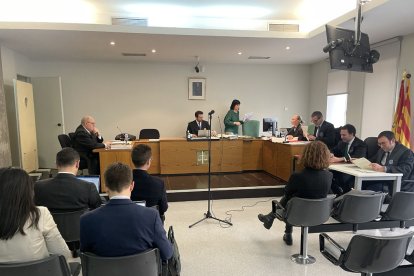Absuelta la doctora denunciada por un testigo de Jehová por transfundirle sangre
El paciente alegó violación de su libertad religiosa pero la Audiencia de Lleida sentencia que la exjefa de Urgencias del Arnau de Vilanova de Lleida actuó bien. Le pedían 15 meses de prisión y dos años de inhabilitación Facebook Twitter Whatsapp Copiar enlace
La Audiencia de Lleida ha ratificado la absolución de la doctora del hospital Arnau de Vilanova que fue juzgada el año pasado por hacer cuatro transfusiones de sangre a un paciente testigo de Jehová el día 21 de julio del 2016. El tribunal desestima el recurso presentado por la acusación y confirma en su totalidad la sentencia del juzgado de lo Penal 2 de Lleida. Cabe recordar que el denunciante, que ejerce la acusación particular, la llevó a juicio al considerar que la médica, que entonces era jefa de Urgencias, era autora de los delitos de coacciones, contra la integridad moral y lesiones, solicitando que fuera condenada a un año y tres meses de prisión, a dos años de inhabilitación y que le indemnizara con 10.000 euros por los daños morales causados. La Fiscalía, la defensa, que ha ejercido el letrado Carles López, del Despatx Simeó Miquel, y el Institut Català de la Salud se opusieron al recurso.
La acusación particular alegó, entre otros aspectos, que el denunciante manifestó su rechazo a la realización de la transfusión, que hubo una infracción con defectos graves a su traducción durante el juicio y que la facultativa incurrió en un delito de coacciones agravades por violación del derecho fundamental a la libertad religiosa, atentó contra su integridad moral y tuvo “una actuación grave”.
El tribunal ha examinado las actuaciones y desestima cada uno de los alegatos.
Read the rest of the original article here [in Spanish]: https://www.segre.com/es/lleida/250319/absuelta-la-doctora-denunciada-por-un-testigo-de-jehova-por-transfundirle-sangre_764189.html
A rough English translation follows here:
The Lleida Court has upheld the acquittal of the doctor from Arnau de Vilanova Hospital who was tried last year for administering four blood transfusions to a Jehovah’s Witness patient on July 21, 2016. The court dismissed the appeal filed by the prosecution and fully confirmed the sentence of Lleida’s Criminal Court No. 2. It’s worth noting that the complainant, acting as a private prosecutor, took the doctor to trial, alleging that she, then the head of the Emergency Department, committed crimes of coercion, violation of moral integrity, and bodily harm. He sought a sentence of one year and three months in prison, two years of disqualification, and €10,000 in compensation for moral damages. The Public Prosecutor’s Office, the defense—represented by attorney Carles López from Despatx Simeó Miquel—and the Institut Català de la Salut opposed the appeal.
The private prosecution argued, among other points, that the complainant expressed his refusal to undergo the transfusion, that there were significant translation defects during the trial, and that the doctor committed a crime of coercion aggravated by violating the fundamental right to religious freedom, attacked his moral integrity, and had “serious conduct.”
The court examined the proceedings and dismissed each of the allegations. It noted that the complainant was conscious and “explicitly refused to sign the transfusion refusal.” During the trial, the Jehovah’s Witness, who testified with a French interpreter, said he did not want to sign because he did not trust the doctor. Furthermore, the Court endorsed the doctor’s actions: “Given the severity of the consequences of refusing the transfusion and the lack of an unequivocal will from the patient, the accused could not have been expected to act differently than to safeguard the person’s life.” Additionally, it determined that the patient “was at no time subjected to degrading or humiliating treatment; on the contrary, he was informed of the severity of his condition and the vital need to undergo a transfusion (…) therefore, her conduct does not deserve criminal reproach.”
The complainant stated he preferred death over receiving the transfusion
The events occurred on July 21, 2016, when the complainant was admitted to the Emergency Department in the early afternoon due to hemorrhages requiring blood transfusions. He was in a state of semi-consciousness with acute anemia and hypovolemic shock. After being diagnosed with gastrointestinal bleeding, doctors explained the severity of his condition, the need for a blood transfusion, and the consequences of not proceeding. The patient refused due to his religious beliefs. Ultimately, four transfusions were administered. During the trial, the complainant stated he preferred to die rather than receive the transfusion. In contrast, the doctor testified that the patient “did not sign the refusal document because he was not convinced and because doing so meant accepting his death.”
Fuentes
